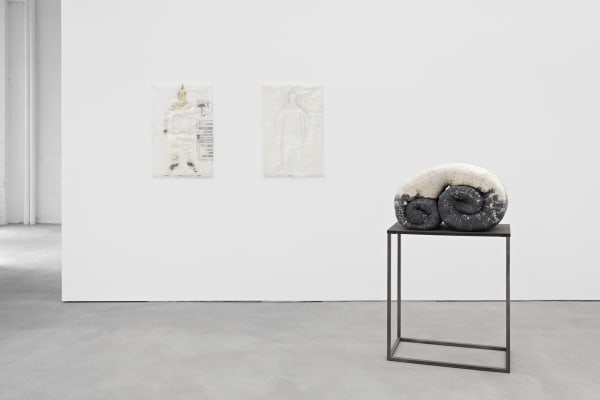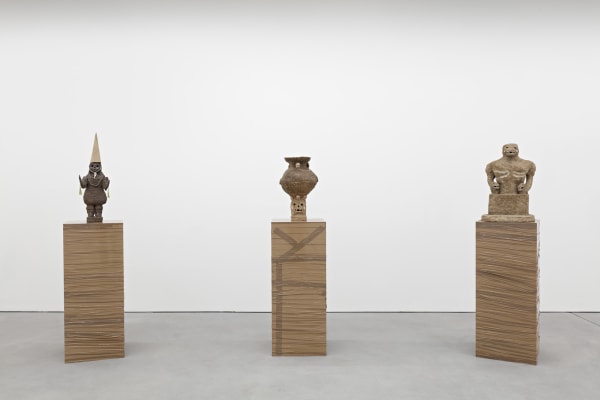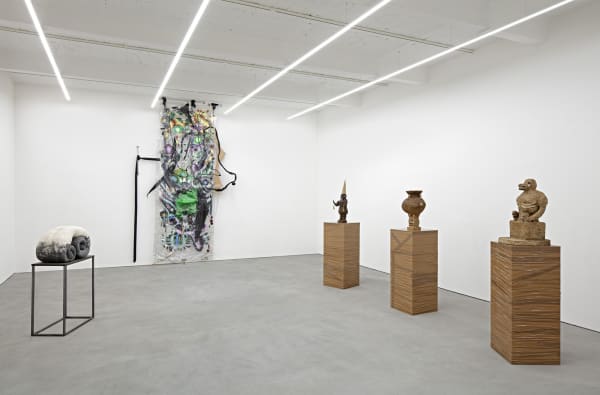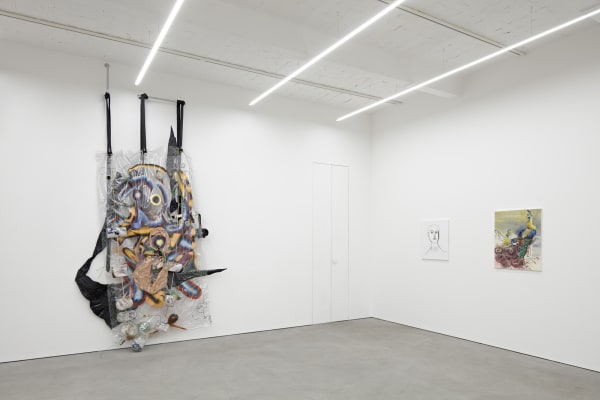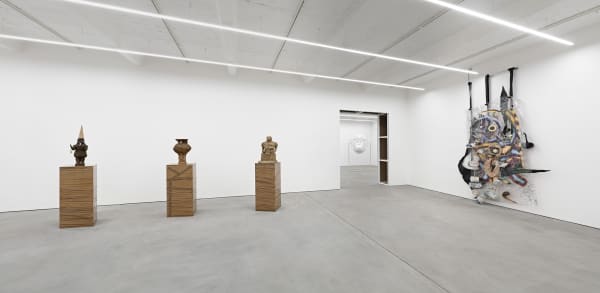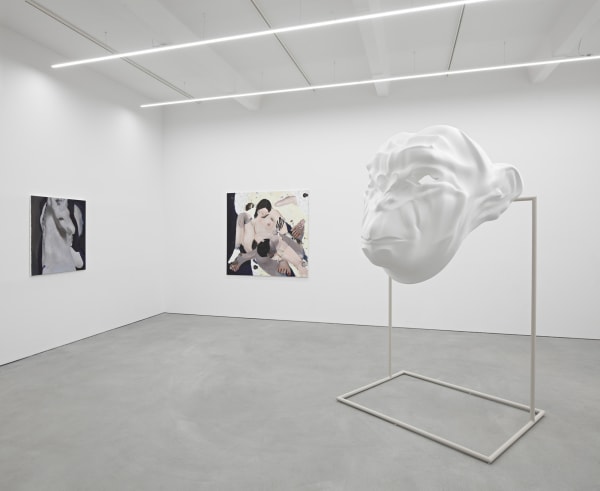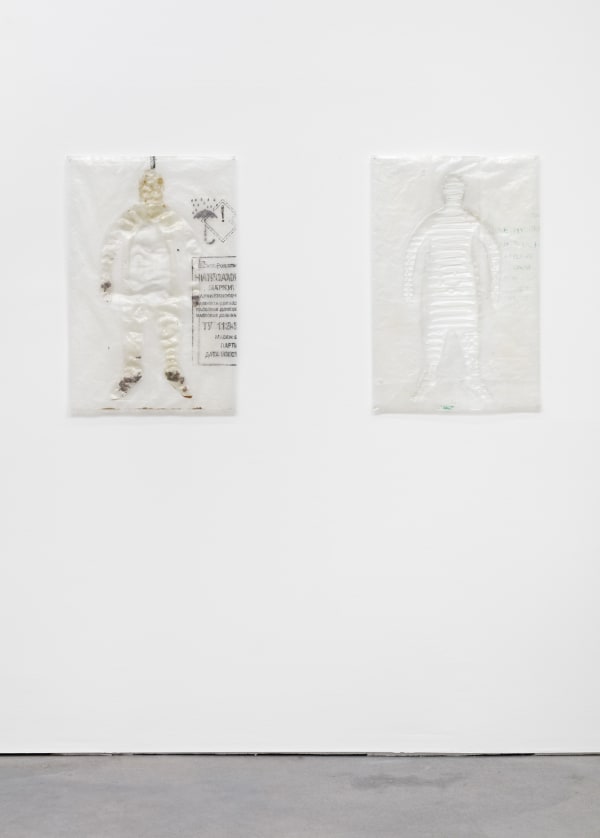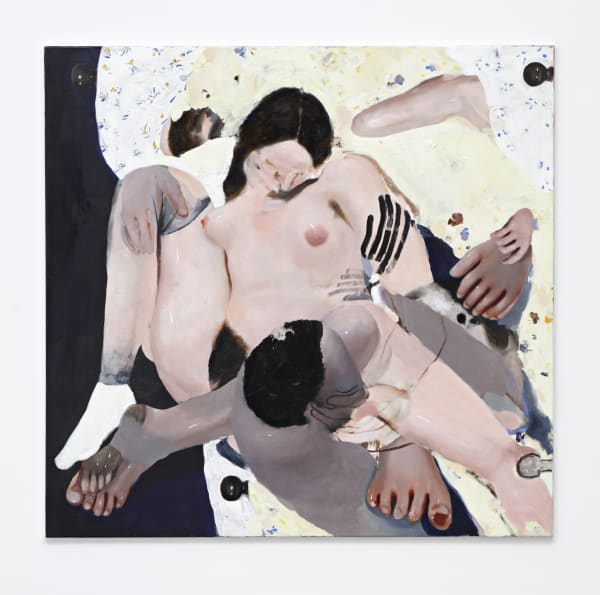CHTHONIC RIFT: EVGENY ANTUFIEW, MARGUERITE HUMEAU, KAYA, ANU PÕDER, AUTUMN RAMSEY, AMBERA WELLMANN
In ancient Western mythology, the universe was understood through constellations of gods, heroes, and hybrid creatures. In their depiction, there was an elevated place for the highly esteemed and worshipped and a beneath-earth realm devoted to the dead and the lost souls. This virtual division of the world, between what was above and below earth, led to a separation between the praised and the disregarded, the high and the low. The introduction of categorical opposites, present in all levels of existence, offers a limited vision of the world in binary categories.
In Chthonic Rift, multiple strategies of both tangible and symbolic order are employed to traverse this divide. Individuals align with their beliefs and emotions in ritualistic encounters, activate affective energy, or map their bodies outside given categories. Under these premises, the imaginary rift that once split above from below the earth and its associated binaries are no longer at work, allowing the emergence of the multiple, the divergent, and the contradictory over the dual and deterministic.
EVGENY ANTUFIEV’s crafted iconic figurines pay tribute to the folklore of Tuva, a Siberian region where Antufiev grew up, considered by some as the home of shamanism. From found objects to stone, wood and bones, Antufiev’s use of materials play around the real and the imagined by enacting them as magical artefacts, transcending categories and geographies. By reassembling symbolic materials connected to his biography, a new set of personal mythologies is created, as well alternate readings and histories all the while remaining intimately connected to his own sense of place.
Evgeny Antufiev (b. 1986, Russia) lives and works Moscow, Russia. Recent selected exhibitions include Archaeological Museum Antonio Salinas, Palermo (2018); War and Peace Project, Strauhof, Zurich (2017); MOSTYN Museum, Llandudno (2017); M HKA – Museum of Contemporary Art Antwerp (2017); performance at Whitechapel Gallery, London (2017) Palais de Tokyo, Paris (2012); New Museum, New York (2011).
MARGUERITE HUMEAU’s recent body of work is devoted to early depictions of Assyrian and Egyptian wars, in which myth and history fused. ‘Kamoya (KNMER1813)‘, composed of sculptural and sonic elements, arises from a newly created imagery based upon the prehistoric cemetery Jebel Sahaba, also known as Site 117. This old historical scenario, on which the earliest warfare known took place 13,000 years ago, is Humeau’s premise for her imaginary battleground. In her re-interpretation of the event fact and fiction merge, materialising as a ferocious beast, whose shining body recalls classic marble figures. It’s contorted face emits soft noises that sculpt the silence. The static set conjures gore but the kind that is kept at a distance.
Marguerite Humeau (b. 1986, France) lives and works in London, UK. Recent solo exhibitions include: Fonderia Artistica Battaglia, Milan (2018); Tate Britain, London (2017); Zürich Art Prize 2017, Museum Haus Konstruktiv, Zurich (2017); Palais de Tokyo, Paris (2017) and Schinkel Pavillon, Berlin (2017). Recent group exhibitions include Hayward Gallery, London (2018); Haus der Kunst, Munich (2018); Kunsthal Charlottenborg, Copenhagen (2017).
KAYA’s influences are wide and eclectic and their work escapes classification and predictability.
Named after the daughter of one of a KAYA’s close friend, the project explores diverse forms of
inter-subjectivity and collectivity. Kaya is a focal point, a muse, a collaborator and a living variable to the project that grows into an expansive network that is always searching for middle grounds, unknown territories and hybrid forms. The formats of painting and sculpture converge in the series of bodybags, a fossil-like sculptural container of what otherwise would be ephemeral, such as the group’s participatory performances. Serving as as a multiple, ever-becoming body, the mylar bags accumulate and preserve remaining objects of a series of KAYA’s acts and, following a geologic logic, they show a history of the sculpture’s making process. The convergence of past and present temporalities in the Bodybags and the process through which they come to life calls into question the
myth of the singular creator and the autonomous artwork.
KAYA, was formed in 2010, by the Kerstin Brätsch (b. 1979, Germany) and Debo Eilers (b. 1974, USA). Recent exhibitions include Fondazione MEMMO, Rome, Italy (2018); KUB Kunsthaus Bregenz, Bregenz (2016); Galerie Meyer Kainer, Vienna (2015). Group exhibitions include the Whitney Biennial 2017, New York (2017); Museum Brandhorst, Munich, (2017).
ANU PÕDER’s depiction of physical and spiritual fragmentation reflects her own personal scenario, existing in an oppressive context of Soviet Estonia and the limiting context of the Post-Soviet one. The use of ephemeral materials such as wax, burlap, rope, string, gypsum, wood, soap and plastic made critics of the time consider her sculptures “bad” but far from keeping her from continuing, critique reinforced her practice, which expressed an ongoing uncertainty towards failures and successes. Originating from the human body, her sculptures traversed the spectrum from figuration to abstraction, looking sometimes like martyr’s bodies harmed by external forces or like mistreated entities claiming for pity. Yet, although pain is inflicted in them, they are not meant to simply inspire compassion, but to appear as predators as well as victims. ‘Import and Export‘ bags present the lack of a body, an emptied space from which the missing figure might have escaped, whereas the sinuous form of ‘Rolled Up Figure‘ is managed with stuffed fabric wrapped up, emulating a bended back in a submissive pose. In these sculptures fear and vulnerability act as a visual metaphor for the sake of empowerment and transcendence.
Anu Põder (b. 1947, d. 2013, Estonia) lived and worked in Estonia. Solo exhibitions include Kumu, Tallinn (2017); Tallinn Art Hall Gallery, Tallinn (2007); Tallinn City Gallery, Tallinn (1999); Kotka City Gallery Kotka, Finland (1994). Selected group exhibitions include Tartu Art House, Tartu (2009); Union, Pärnu, Estonia (2009).
AUTUMN RAMSEY’s paintings portray anthropomorphic as well as animal figures in states of becoming – processed, recombined, and abstracted – melting with other elements. A strong symbolism is addressed in the painting ‘Displaying‘, in which two peacocks gaze at the viewer and pose in an imposing fashion. The animals, symbols of integrity and rejuvenation, display their attributes with certain arrogance and the feeling of decadence seem to appear out of the exuberant depiction of their physical virtues. In a stark contrast, ‘Them‘ presents depiction of beauty that is undefined yet alluring. In Ramsey’s imagery, the harmonious and extravagant fuse with hints of darkness and mystery, blurring the charming and the undesirable together in a set of hybrid androgynous beings.
Autumn Ramsey (b. 1976, USA) lives and works in Chicago, United States of America. Recent selected solo and two person exhibitions include Chapter, New York (2018); Crèvecoeur, Paris (2018). Recent selected group exhibitions include Autumn Ramsey & Eugene Von Bruenchen, Jessica Silverman Gallery,
San Francisco (2018); Lyles and King, New York (2018); Rob Tufnell, Cologne (2017) and Tanya Leighton, Berlin (2017).
AMBERA WELLMANN’s recent body of work generates and embraces the uncanny, with paintings that amalgamate layers of different nature on the canvas. Iconic figurines from the emblematic German porcelain factory Meissen turn into whimsical animals, and human bodies dissolve with one another in sexual encounters, all turning into hybrid beings, becoming a dynamic existence, playing between the traditional and the subversive. Pleasure and discomfort are brought together in partial depictions rendered distorted and incomplete. Genres such as the nude or the still-life get reinterpreted and subjected to Wellmann’s own unconscious psychological desires, in which corporeality morphs through
the material layers in between moments of contained ecstasy.
Ambera Wellmann (b. 1982, Nova Scotia) lives and works in Berlin, Germany. Recent solo and two person exhibitions include Projet Pangée, Montreal, (2018); Suzanne Biederberg Gallery Amsterdam, (2017); Dupont Projects Toronto, (2016). Recent group exhibitions include Paul Kasmin Gallery, New York, (2018); Oakville Galleries, Oakville (2018); Regional Centre for Contemporary Art, Sète, France (2018); Arsenal Contemporary, New York (2018).

